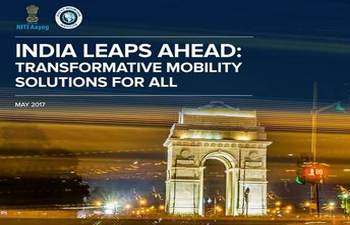Knowledge Hub
India is at a critical juncture in its infrastructure, energy, and mobility development. The nation has seen a 10 percent annual increase in vehicles registrations over the last decade and is set to surpass Germany as the world’s fourth-largest car market by domestic sales by the end of 2017.
A Charging Place to be - Users' Evaluation Criteria for the Positioning of Fast-charging Infrastructure for Electro Mobility
2015
Author(s): Philipsen R, Schmidt T, Ziefle M
The main aim of this study was to identify user criteria for the allocation of fast-charging stations. The paper identifies not only which locations of fast-charging stations in a city are preferred but also reveals how users evaluate them.
India’s electric mobility transformation
2019
Author(s): NITI Aayog, Rocky Mountain Institute (RMI)
India is on the cusp of revolutionizing its mobility system. The government has devised a twofold approach through the Faster Adoption and Manufacturing of Electric Vehicles (FAME) Scheme, which aims to benefit Indian industry and citizens
India, along with other parts of the world, is facing significant social and economic challenges after implementing measures to contain the spread of COVID-19. In response to the economic fallout, India announced a Rs 20 lakh crore (US$266 billion) relief package—one of the largest stimulus packages in the world as a share of gross domestic product (GDP).
Relationship Between Spatio-Temporal Electricity Cost Variability and E-Mobility
2015
Author(s): Usman M, Fraile-Ardanuy J, Knapen L, Yasar A-U-H, Bellemans T, Janssens D, Wets G
Charging cost of electric vehicles depends on the selection of the charging strategy when operating in a spatio-temporal electricity pricing market.

Feebates—market-based, revenue-neutral, and size-neutral—can act as an important policy lever in support of India’s “leapfrog” vision of an electric, shared, and connected mobility system by incentivizing the production and use of clean vehicles, according to a new report.
Agent-based Simulation of Electric Taxicab Fleets
2014
Author(s): Bischoff J, Maciejewski M
Battery operated electric vehicles offer the opportunity to manage zero-emission car traffic at low operational costs. In this paper, a battery operated electric taxicab fleet is simulated in a small city scenario using the agent-based transport simulation MATSim.
Design and Evaluation of In-Line Product Repair Strategies for Defect Reduction in the Production of Electric Drives
2014
Author(s): Colledani M, Coupek D, Verl A, Aichele J, Yemane A
Manufacturing companies are continuously facing the challenge of operating their manufacturing processes and systems in order to deliver the required production rates of high quality products of in...
Accelerating Bangalore’s Mobility Transition
2020
Author(s): Rocky Mountain Institute, RMI India, Micelio
Cities across India are witnessing rapid urbanization and growing mobility demand. Developing and deploying shared, clean, and citizen-centric mobility solutions will be critical to ensure this demand is met in a sustainable manner that provides safe, accessible, and reliable transportation for citizens.
RMI’s report Reducing EV Charging Infrastructure Costs finds that the electric vehicle (EV) charging industry needs to do what the solar industry did about a decade ago: streamline and de-bottleneck installation.



